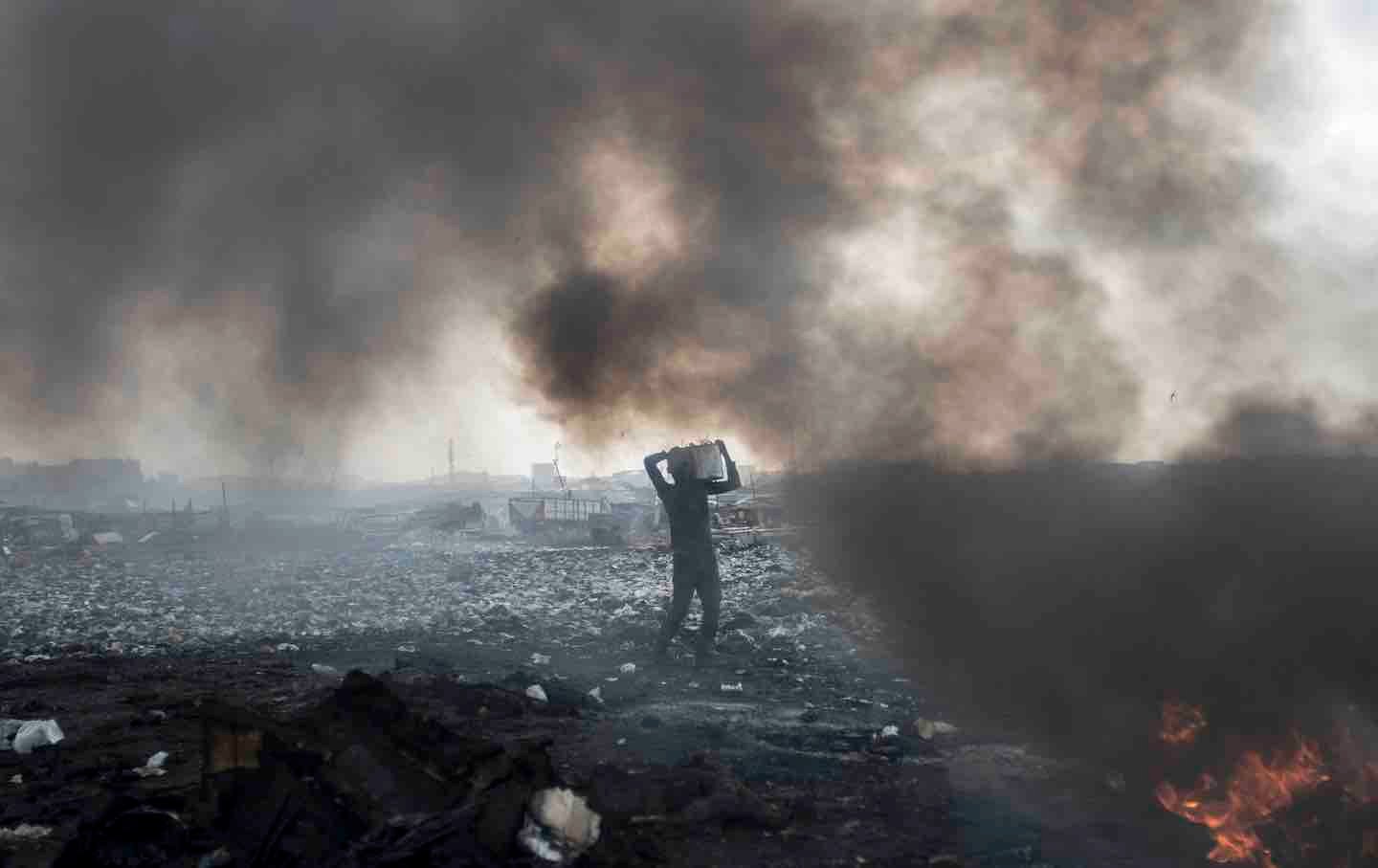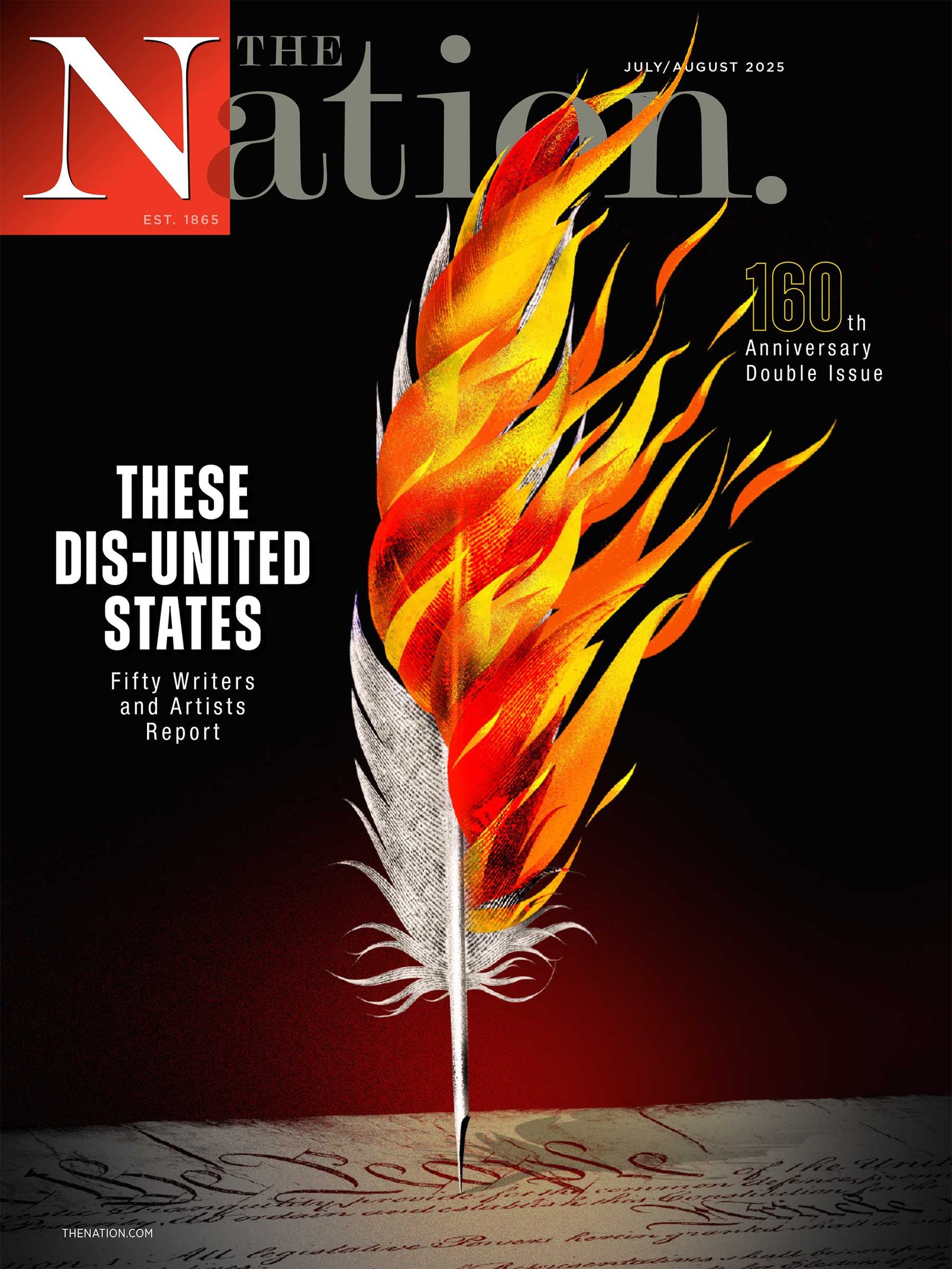Alexander Clapp’s Waste Wars, a world-spanning inquiry into the politics of garbage, makes a case that everything that is wrong with capitalism is embodied in our trash.

A man carries electronic waste at Agbogbloshie dumpsite in Ghanaian capital of Accra, 2017.
(Cristina Aldehuela / AFP / Getty)
In 1960, the journalist and social critic Vance Packard identified a trend in American consumer culture: “planned obsolescence.” Either through superficial changes that made the older models appear outdated or through deliberately shortened product lifespans, consumers were encouraged to buy more, which also meant wasting more. It was a sales tactic, Packard found, originally popularized by a 1932 snake-oil salesman turned entrepreneur named Bernard London. London argued that manufacturers should deliberately shorten the lifespan of their products to drive continual consumer demand, boost sales, and keep the industry’s wheels turning. Just a few decades later, Packard argued that planned obsolescence was changing the very character of the American shopper: “We are being trained to live wastefully, with the idea that this is somehow patriotic,” he wrote in his book The Waste Makers.
Books in review
Waste War: The Wild Afterlife of Your Trash
by Alexander Clapp
Buy this book
Packard was perhaps the 20th century’s most prolific Cassandra on the trajectory of American consumerism, a way of life that has touched every corner of the globe and reshaped the world economy. Americans are the world’s foremost buyers, and the rest of the world—until recently—has mostly happily served as willing merchants and manufacturers. This cycle of consumption has created so much trash on the planet that the quantities are almost impossible to comprehend.
Waste, by its nature, is a problem continually deferred. Where it goes is, at best, an afterthought, and likely not a pleasant one. We may dutifully sort and recycle our trash, but we are otherwise powerless to control the destiny of the detritus in our modern lives. Packard saw rampant consumerism as creating a “‘throwaway society,’ where material goods are treated as disposable and people are encouraged to waste as a sign of prosperity.”
In Waste Wars: The Wild Afterlife of Your Trash, the journalist Alexander Clapp examines how so much of the junk produced in the Western Hemisphere has become a problem for the world’s most impoverished and economically desperate countries. Through stories of toxic e-waste in Ghana, illegal dumps in Turkey, deadly shipbreakers in the Aegean Sea, plastic-sludge riverbanks in Guatemala, and trash chiefs in Indonesia, Clapp exposes a global waste economy underpinned by exploitative labor and environmental degradation. More than six decades after Packard warned of a nation conditioned to consume and discard, Clapp’s reporting underscores that garbage is not just an intractable problem of modern capitalism but also an encapsulation of the global inequities that define our waste-filled world.
At the start of Waste Wars, Clapp quotes the American economist and retail analyst Victor Lebow, who asserted that productive economies and waste go hand in hand and that prosperity necessitates that “we need things consumed, burned up, worn out, replaced and discarded at an ever-increasing pace.” Such mindless consumption fuels affluence, in this view, and what follows in Waste Wars is a sobering description of the results.
Clapp begins with the story of a Kurdish citrus farmer in Turkey who one day sees a truck dumping a load of garbage on his property and then the driver setting it aflame. After putting out the fire, the farmer finds receipts and wrappers not in Kurdish or Turkish, but with the price tags denominated in euros and pounds. The pastoral life of an Anatolian citrus farmer being disrupted by the flaming trash of consumers living in the European Union and Britain is a darkly ironic image of the inescapability of global capitalism. And the trash brokers responsible, the ones who moved this consumer waste to an unlikely corner of Anatolia, are a world of “grifters and hustlers,” according to Clapp, who “reach down into your recycling bin and rinse out the last rancid drops of profit.”
In the United Kingdom, for example, more than 250,000 waste brokers would eventually be found to be operating without legal permits. Without such permits, there’s no oversight—waste can be misclassified, dumped, or illegally exported with no accountability, all while the brokers still collect a profit. But even permits can’t address the scope of the problem: The need for waste management is so widespread, and the process so unregulated, that the journalist and environmental activist George Monbiot managed to register his long-dead goldfish for a permit in around four minutes. With so many untraceable brokers and more waste than the system can handle, it’s no surprise that what isn’t managed at home ends up smoldering in someone else’s orchard half a world away.
Clapp, who lives in Greece and is a regular contributor to publications like New Left Review and the London Review of Books, spent more than two years crisscrossing the globe to follow the money and garbage of this international trash trade. But while he’s well versed in telling stories about the disturbing consequences of a globally unequal system, his is not the first book to have tackled the subject. The 2023 book Wasteland, by Oliver Franklin-Wallis, also explored the strange and often illogical world of global waste bartering, and Clapp even journeys to some of the same places that Franklin-Wallis visited. But where the latter approached the issue with more of an environmentalist’s eye, Clapp centers on the systemic roots of the problem and the ways that we are all complicit.
Of course, Clapp also details the deleterious environmental effects of the trash trade and its contribution to global pollution. In one section dedicated to an electronics trash heap in Ghana called Agbogbloshie, he cites research showing that the eggs produced by chickens in the area are the most toxic in the world, and notes that the ground is considered by some scientists to be as toxic as the soil around Chernobyl.
But his eye is more keenly trained on the vast ironies and injustices that our global economic system produces, as well as the seemingly harmless ways in which we all unknowingly participate. Discarded electronics arrive at Agbogbloshie in a never-ending stream of shipping containers from the Global North. Workers—mostly illiterate economic refugees from Ghana’s impoverished north, who dream of saving up enough money to return to their ancestral land to farm yams—spend all day cracking apart the discarded electronics to get at the meaty mess of copper and other valuable materials inside. They strip the parts for these precious items and then burn the rest, breathing in fumes day in and day out that eventually leave them coughing up blood. But the toxins don’t just vanish into the air (or into the lungs of the people who breathe it)—they also seep into the soil and waterways, ensuring that the damage becomes a burden for generations to come.
In Clapp’s telling, the story of Agbogbloshie is also the story of a dream deferred. Ghana, ridden with debt and on the verge of bankruptcy in the 1980s, was desperate for development but had few reliable ways to secure the necessary investment. The Internet seemed to promise an opportunity to “leapfrog” over the painful and expensive periods of industrialization that had produced functioning modern economies elsewhere in the world in the 19th and 20th centuries. Instead, workers could join the burgeoning cyber economy of the 21st century; all anyone needed was a computer and an Internet connection. Ghana was young, with 60 percent of its growing population under the age of 25, and it was also a relatively stable country with few tribal conflicts. So it jumped at the chance to “[get] ahead by getting online.”
“Bringing the Internet to Ghana was one thing,” Clapp writes, but “bringing millions of ordinary Ghanaians to the Internet was another.” And just as Ghana was looking for ways to get its population online, a cynical solution was emerging to the problem of electronic waste in the developed world.
In 1997, the average computer lifespan was six years; by 2005, it was fewer than two. Clapp invites the reader to think of a smartphone and “consider all the ways its manufacturers and sellers tempt, goad, and press you into purchasing a new one earlier than you had anticipated.” With updated security systems that won’t function on older models, ever-changing charging-cable designs, and even the expensive replacement of key parts such as screens and batteries, it becomes prohibitively expensive (if not actually infeasible) to maintain older phones, which in turn forces you to buy a new one every few years. Clapp borrows from Packard’s examination of “planned obsolescence,” but he adds some modern insights and twists that even Packard himself might not have envisioned.
As protection for innovations in technology moved away from patents, which protect physical inventions, and moved to copyright, which protects “intellectual property” and “authorship,” more products became reliant on software repairs that were available only from the manufacturer. “Attempting to fix your smartphone or refrigerator yourself amounted to, in legalistic terms, a kind of plagiarism,” Clapp writes.
The combination of expensive or even impossible repairs and an increasingly shrinking window of operability for technology meant an explosion of e-waste. And thanks to incentives from the International Monetary Fund and the World Trade Organization, Ghana was soon importing e-waste by the ton. The Basel Convention, a 1989 treaty designed to control the movement of hazardous waste across national borders (which has been signed by 191 countries, although the United States is one of the few major countries to never ratify its signature), has a convenient exemption: If an item is being shipped for “direct reuse,” it is not considered waste. And so barely functioning electronics from the West were “donated” (or, in reality, sold at a discount) to Ghana under the ruse that it was all in the service of Ghana’s development.
As Clapp explains, “In their willingness to pay for cargo containers full of such faltering gadgets from the Global North, importers in a country like Ghana perform an invaluable service for the world’s tech sector, offering up an outlet for electronics that would otherwise be messily accumulating in the countries where they were originally purchased.” To keep tech progress churning, more devices needed to be produced and sold, which meant that more needed to be discarded, which created a demand for places like Agbogbloshie.
Clapp identifies Ghana, and Africa more broadly, as a “sacrificial zone of disposal”—meaning that what happens there doesn’t matter to the countries exporting their pollution, so long as the waste is taken far away and becomes someone else’s problem.
Popular
“swipe left below to view more authors”Swipe →
Spanning five continents and their tons and tons of trash, Waste Wars is held together by its indictment of the myopia of modern capitalism and the waste it inevitably produces. Readers can expect to feel enraged and also a little hopeless: We may do our best to be responsible actors within this system, but to live entirely outside it is almost certainly an impossible task. Despite the incredibly depressing injustices that Clapp exposes, his journey is, at times, almost as comical as it is jaw-dropping. He returns near the end of the book to the Kurdish citrus farmer, who has become a “lonesome sheriff” fighting against the trash arriving on his property. Now he follows the trucks down the road, chasing them away and ensuring that they don’t dump on his land. Through the stories of such people and places, Waste Wars reveals the price that is paid by others for the conveniences in our own lives, which may otherwise remain unknown to us.
Clapp has no easy solutions to offer for this dilemma, and maybe that’s the point: Waste isn’t just what we discard—it’s what our system is built to ignore. Waste Wars shows that Packard’s “throwaway society” didn’t just come true; it went global. In following the trail of trash to its farthest, most forgotten destinations, Clapp forces us to confront what we’d rather not see: that the afterlife of our waste has become a growing crisis, a new front line in a system cracking under its own excess. And once you’ve seen that, it’s hard to look away.



